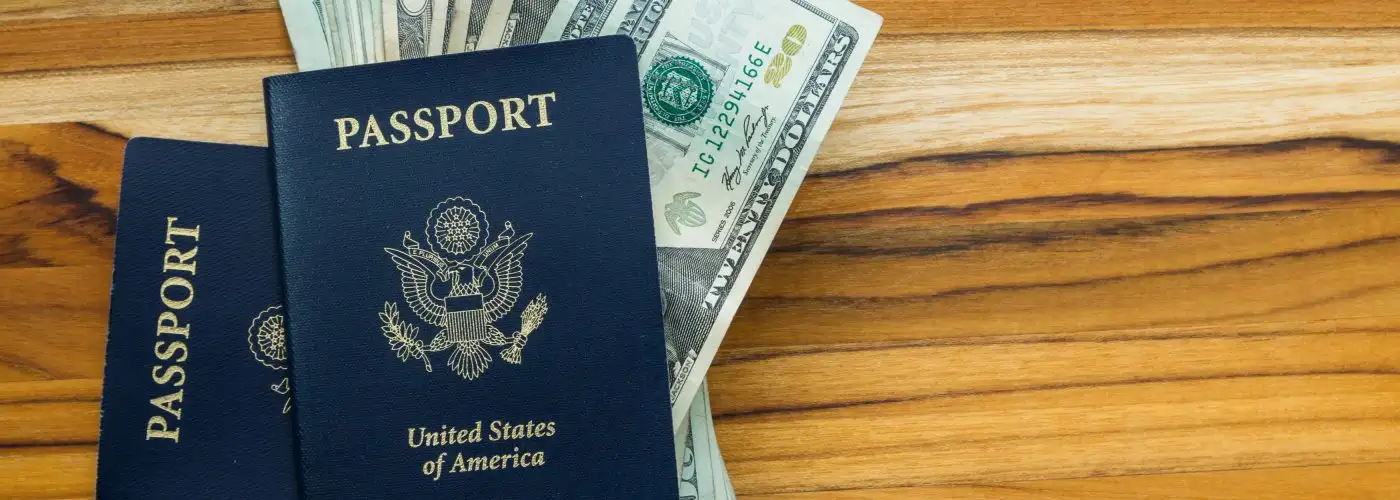Before you leave for your next trip abroad, take a moment to think dollars and cents — or should we say pounds and pesos? Get the most for your money overseas by doing a little homework first.
The most important step is to know your options. In decades past traveler’s checks were the most popular way to carry money overseas — but today’s travelers are much more likely to rely on credit cards and ATM withdrawals, which usually offer better exchange rates and lower fees.
What’s the best option for you? And how can you avoid those pesky currency conversion fees when making purchases abroad? Read on for answers to these questions and a comprehensive roundup of all your currency conversion options when you’re traveling overseas.
Credit Cards
Best for: Large purchases such as airline tickets, hotel bills, car rentals and restaurant meals.
Pros: The biggest advantage to using credit cards while traveling overseas is that credit card purchases are exchanged at the interbank exchange rate, usually the best rate you can get for currency exchange. While most credit card issuers charge currency conversion fees each time you make a purchase in a foreign currency (generally 1 percent from Visa or MasterCard plus an additional 1 – 2 percent for themselves), these fees are typically lower than those you’d pay to convert your own currency at a change bureau. And there are a few cards out there (many from Capital One) that do not charge any foreign transaction fees at all, not even the ones from Visa or MasterCard. Check out Airfarewatchdog, SmarterTravel’s sister site, for a list.
Cons: Some restaurants, stores and even hotels won’t take credit cards, so you’ll need to have cash on hand at all times. While you can use credit cards to get cash advances at ATMs, bear in mind that they’ll be subject to any finance charges your credit card company imposes — which can add up very quickly. Plus, if you’re not home by the time the bills come in and you haven’t made arrangements to pay them, you’ll be hit with hefty finance charges on these advances.
One problem for U.S. travelers is the growing prevalence of “chip-and-PIN” credit cards in Europe, Asia and South America. Designed to reduce fraud, these cards rely on an embedded chip that transmits information to a merchant, which the consumer then verifies by entering a PIN. While U.S. cards with magnetic stripes will still work as long as there’s someone to swipe them, many travelers report problems using their cards in ticket vending kiosks, at gas stations or in other places featuring automated payment machines. If you find yourself in this dilemma, your only alternatives are to find an attendant to scan your card or to use cash instead.
These cards are slowly becoming more available to U.S. travelers. Check out CardHub.com for a list.
What You Need to Know: The first thing you should do if you are traveling abroad with a credit card, even if you only plan to use it in case of an emergency, is to call the issuer and ask which fees will apply to your purchases, both in local currency and in U.S. dollars. We recommend calling before each trip, as these policies may change without notice.
While you’re on the phone, let your credit card issuer know when and where you will be traveling — that way the sudden international activity on your account won’t trigger your issuer’s fraud alert system. As a precaution, we recommend bringing two credit cards on your trip in case one stops working. Finally, get a phone number that you can use to call the company from overseas if your card is lost or stolen. (The 800 number on the back of your card typically will only work in the U.S. or Canada.)
Some merchants (particularly in Europe) offer what’s known as dynamic currency conversion, which means that they’ll charge you in dollars rather than the local currency. Because some card issuers will waive the currency conversion fee if your overseas purchase is made in dollars, dynamic currency conversion could help you save a few coins. However, keep in mind you’ll almost always get hit by a conversion fee from the merchant instead — sometimes up to 5 percent — so you may end up losing out on the deal. Be sure you know which fees apply to either option before deciding which currency to use.
A few other caveats to bear in mind: Some hotels and car rental companies may put holds on your credit card for the amount of your total expected bill. This can use up your credit line before you’ve actually incurred and paid for the charges. All merchants are supposed to inform you if they do put a hold or “deposit” on your card. If they do, make sure you clarify that the hold has been removed when you’ve paid your bill in full.
Keep in mind that you may not have as much protection overseas as you do at home when problems arise over inaccurate charges. Incidents are always being reported of travelers being charged twice for the same item or for items they never purchased, and credit card companies are not always willing or able to intercede on their behalf. Always watch merchants imprinting your card and keep your receipts. After you get home, check your credit card statement. If you see charges you didn’t make, call your creditor and ask them to dispute the charges.
Neck Wallet
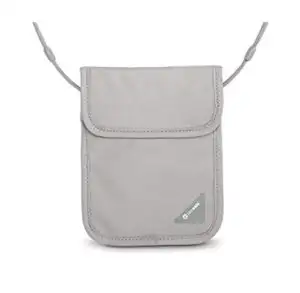
Designed to be worn under clothing, this RFID blocking neck pouch offers an added layer of security for any important credit cards when traveling abroad. This wallet is discreet while still keeping your essentials in easy reach and is offered in neutral colors!
Debit and ATM Cards
Best for: Getting cash in local currency.
Pros: You’ll get the same great interbank exchange rate when you make cash withdrawals with your debit or ATM card as you do when you make a credit card purchase. With ATMs available in major cities and airports all over the world, this is generally the cheapest and most convenient way to get cash in the local currency.
Cons: Each cash withdrawal you make will usually be subject to currency conversion fees, foreign ATM fees or other charges from your bank and/or the local bank that maintains the ATM. For more information, see ATMs Abroad. Debit cards work pretty much the same as regular credit cards for purchases, but if your card is lost or stolen you may not have the same protection. By U.S. law, as long as you report your card missing within two business days, your maximum liability for use of that card will be $50 — the same as for a credit card. However, if you wait any longer, you could be responsible for hundreds of dollars in unauthorized charges.
What You Need to Know: If the ATM card from your home bank isn’t connected to the worldwide Cirrus or PLUS networks, you may want to look into getting a MasterCard or Visa debit card. While they look and can be used like regular charge cards, they actually debit your checking account the same way your ATM card does.
If you are renting a car, you should be aware that debit cards are not always accepted and may sometimes be subject to additional red tape.
Finally, don’t forget to call your bank and make it aware of your travel plans; as with credit cards, sudden international activity using your debit card could cause your account to be frozen.
RFID Blocking Wristlet
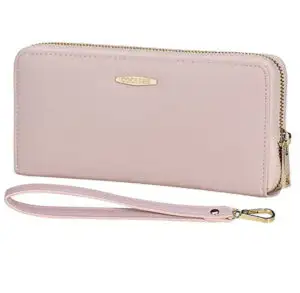

This stylish wallet comes complete with RFID blocking function so you have an added layer of protection when it comes to keeping your finances secure while traveling. Not only does it easily fit your important credit cards, identification, cash and your phone, the classy exterior looks amazing with any outfit!
Cash
Best for: The first 24 hours of your trip — to tide you over until you can find the nearest ATM.
Pros: It’s often a good idea to get some foreign currency before you leave home so that you have cash on hand to handle your immediate expenses — like buying a meal at the airport or taking a cab to your hotel. This way you’re not stranded without cash if the airport ATM isn’t working or you arrive after the local exchange bureau has closed.
Cons: You typically won’t get a great conversion rate from your home bank, and you may also have to pay fees or commissions. If you’re traveling to a major international airport in a large city, which will likely have multiple ATMs and change counters, getting currency beforehand probably isn’t necessary.
What You Need to Know: You can get foreign currency from your local bank, online or at the airport. Try your local bank first, as they may waive fees for certain accountholders. We recommend bringing $100 – $150 worth of foreign currency. See Buying Foreign Currency: Get More Bang for Your Buck for tips.
Bra Stash/ Belt Loop Wallet
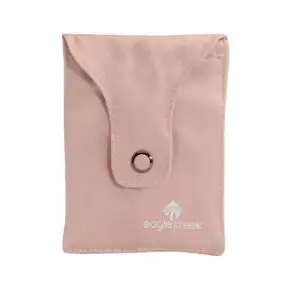

The Silk Undercover Bra Stash: this stylish, discrete wallet is meant to be worn under-clothing or attached to a belt loop for extra security. This wallet is designed to keep your cash secure and hidden. The silky smooth material comes with a moisture resistant lining for maximum comfort.
Traveler’s Checks and Prepaid Cards
Best for: Emergency backup if you can’t find a functioning ATM (checks) or a secure alternative to cash (checks and check cards).
Pros: Traveler’s checks and check cards provide more security than cash because they can be replaced (usually within 24 hours) if lost or stolen. While traditional traveler’s checks have largely gone the way of the dinosaur, Visa and Travelex offer travel cards that are prepaid like traveler’s checks but work like credit cards for purchases and ATM withdrawals. To avoid the aforementioned problems that U.S. travelers have at overseas chip-and-PIN machines, Travelex even offers a chip-and-PIN card called Cash Passport (available in several different currencies). Traditional checks from American Express are still sometimes useful as currency if you can’t find a functioning ATM.
Cons: The exchange rate for traveler’s checks is not as favorable as the interbank rate you’ll get when using a credit or debit card, and very few merchants accept the checks for purchases these days. You’ll also have to pay commissions, shipping charges and/or conversion fees to purchase and cash the checks. The prepaid cards have plenty of fees too — look out for activation fees, charges for reloading the card, ATM charges or inactivity fees. In most cases, you’re probably better off using your own debit card.
What You Need to Know: Keep your checks’ serial numbers in a secure but separate place from the checks themselves in case they’re lost or stolen.
Hidden Wallet
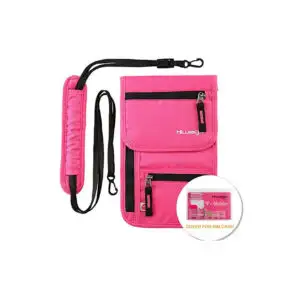

This RFID blocking wallet safely stores cash, passports, credit cards and fits all iPhone models and provides a safe guard between your belongings and any pickpockets.
Sending Money Overseas
Best for: Emergencies when you need money sent overseas in a hurry.
Pros: If you find yourself stranded overseas without cash, someone at home can wire money to you and you’ll have it within a day — or even a few minutes.
Cons: Fees for sending money abroad can run anywhere from 1 to 10 percent or more; in general, the faster you need the money, the more expensive it will be.
What You Need to Know: The best-known companies for sending money are Western Union and MoneyGram. Both charge variable fees depending on how much money you’re sending, where you’re sending it and how your recipient will access it. The slower the service you choose, the more economical the price.
Other choices for sending money abroad include bank wire transfers or international postal money orders from the post office. While less expensive, these methods may take more time.
More From SmarterTravel:
- 10 Travel Money Mistakes to Avoid
- A Newbie’s Guide to International Travel
- 11 Ways to Prevent Identity Theft While Traveling
We hand-pick everything we recommend and select items through testing and reviews. Some products are sent to us free of charge with no incentive to offer a favorable review. We offer our unbiased opinions and do not accept compensation to review products. All items are in stock and prices are accurate at the time of publication. If you buy something through our links, we may earn a commission.
Related
Top Fares From Columbus, OH
Today's Top Travel Deals
Brought to you by ShermansTravel
Shop and Save with Country Inns...
Patricia Magaña


$229 -- Chicago: Discounted Rates and...
Francesca Miele


$188 -- Honolulu: Save on Oceanview...
Abigail Lamay


